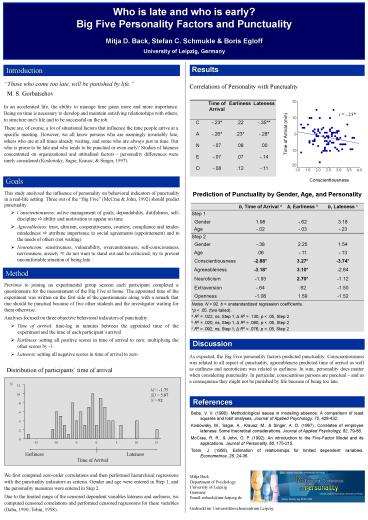PowerPointPrsentation - PowerPoint PPT Presentation
1 / 1
Title:
PowerPointPrsentation
Description:
In an accelerated life, the ability to manage time gains more and more importance. ... Neuroticism: sensitiveness, vulnerability, overcautiousness, self-consciousness, ... – PowerPoint PPT presentation
Number of Views:36
Avg rating:3.0/5.0
Title: PowerPointPrsentation
1
Those who come too late, will be punished by
life. M. S. Gorbatschov In an accelerated
life, the ability to manage time gains more and
more importance. Being on time is necessary to
develop and maintain satisfying relationships
with others, to structure one's life and to be
successful on the job. There are, of course, a
lot of situational factors that influence the
time people arrive at a specific meeting.
However, we all know persons who are seemingly
invariably late, others who are at all times
already waiting, and some who are always just in
time. But who is prone to be late and who tends
to be punctual or even early? Studies of lateness
concentrated on organizational and attitudinal
factors - personality differences were rarely
considered (Koslowsky, Sagie, Krausz, Singer,
1997).
Correlations of Personality with Punctuality
- This study analyzed the influence of personality
on behavioral indicators of punctuality in a
real-life setting. Three out of the Big Five
(McCrae John, 1992) should predict punctuality - Conscientiousness active management of goals,
dependability, dutifulness, self-discipline ?
ability and motivation to appear on time - Agreeableness trust, altruism, cooperativeness,
courtesy, compliance and tender-mindedness ?
attribute importance to social agreements
(appointement) and to the needs of others (not
waiting) - Neuroticism sensitiveness, vulnerability,
overcautiousness, self-consciousness,
nervousness, anxiety ? do not want to stand out
and be criticized try to prevent uncomfortable
situation of being late
- Previous to joining an experimental group session
each participant completed a questionnaire for
the measurement of the Big Five at home. The
appointed time of the experiment was written on
the first side of the questionnaire along with a
remark that one should be punctual because of
five other students and the investigator waiting
for them otherwise. - Analyses focused on three objective behavioral
indicators of punctuality - Time of arrival time-lag in minutes between the
appointed time of the experiment and the time of
each participants arrival - Earliness setting all positive scores in time of
arrival to zero multiplying the other scores by
-1. - Lateness setting all negative scores in time of
arrival to zero. - We first computed zero-order correlations and
then performed hierarchical regressions with the
punctuality indicators as criteria. Gender and
age were entered in Step 1, and the personality
measures were entered in Step 2. - Due to the limited range of the censored
dependent variables lateness and earliness, we
computed censored correlations and performed
censored regressions for these variables (Baba,
1990 Tobin, 1958).
As expected, the Big Five personality factors
predicted punctuality Conscientiousness was
related to all aspect of punctuality,
agreeableness predicted time of arrival as well
as earliness and neuroticism was related to
earliness. In sum, personality does matter when
considering punctuality. In particular,
conscientious persons are punctual and as a
consequence they might not be punished by life
because of being too late.
Distribution of participants time of arrival
Mitja Back Department of Psychology University of
Leipzig Germany Email mback_at_uni-leipzig.de Gedru
ckt im Universitätsrechenzentrum Leipzig































